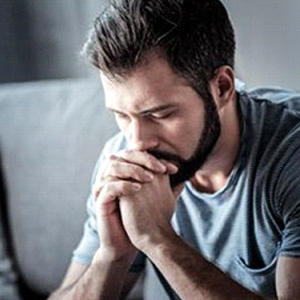According to a 2015 study published in the Journal of Clinical Sleep Medicine, 73% of participants diagnosed with sleep apnea also exhibited symptoms of depression. After three months of dedicated sleep apnea treatment, that number dropped to 4%. This begs the question: Is it depression or sleep apnea?
Is it depression or sleep apnea?
Sleep apnea is a condition in which a person periodically stops breathing throughout the night. It prevents the brain from reaching the deep sleep cycle responsible for healing and restoration that the body needs to function well while awake. If this happens regularly, you can develop sleep deprivation-like symptoms, which in turn mimic symptoms of depression: brain fog, confusion, and excessive daytime tiredness to name a few. If you don’t know you have sleep apnea, it would be easy to believe it’s depression and seek help from a mental health professional. It’s estimated that up to 80% of the 22 million people with sleep apnea are undiagnosed, and if they have any of the above symptoms, they may seek out a doctor’s help believing they have depression. In particular, men who reported excessive daytime sleepiness, but were not yet diagnosed with sleep apnea, were four times more likely to report symptoms of depression versus the two percent that was diagnosed with and treated for sleep apnea.
The Study
The 2015 JCSM study looked at 426 people comprised of 243 men and 183 women who had been referred to a hospital sleep center with suspected sleep apnea. Following a polysomnogram, or sleep study, 293 people were formally diagnosed with sleep apnea, and of those, 213 people exhibited symptoms of depression during the preliminary testing. Participants were asked to wear a CPAP machine for 5 hours a night for three months. During the three months, all 228 participants who adhered to the specified treatment had a significant improvement in symptoms of depression, and after three months, at the completion of the study, only nine patients still felt substantial symptoms of depression. Even more impressive is of the 41 study participants who reported having suicidal thoughts or thoughts of self-harm before treatment, none reported having these symptoms after the three-month treatment phase.
The Result
While this study, in particular, focused on the use of CPAP machines as a means of treatment, other studies including this one from the NIH, indicate that mandibular appliances are a just as effective treatment for those that can’t tolerate CPAP treatment. Mandibular appliances position your jaw in a slightly forward position which helps support the soft tissues of the oral cavity, preventing the blockage of the airway during sleep. These results also stress the importance of airway screenings done by many dentists at routine dental exams, especially in patients with a history of depression. Many dentists now perform an airway screening at routine dental exams. They ask patients about disrupted sleep, snoring, excessive daytime sleepiness, the inability to focus and other symptoms linked to sleep apnea and depression to determine whether a sleep study should be done. If you have symptoms of depression, click here to take our sleep survey and see if you also have symptoms of sleep apnea. At Go To Sleep Center, we are passionate about our patients’ overall health and well-being. Contact Us today to learn how we can help you live better & sleep better!

